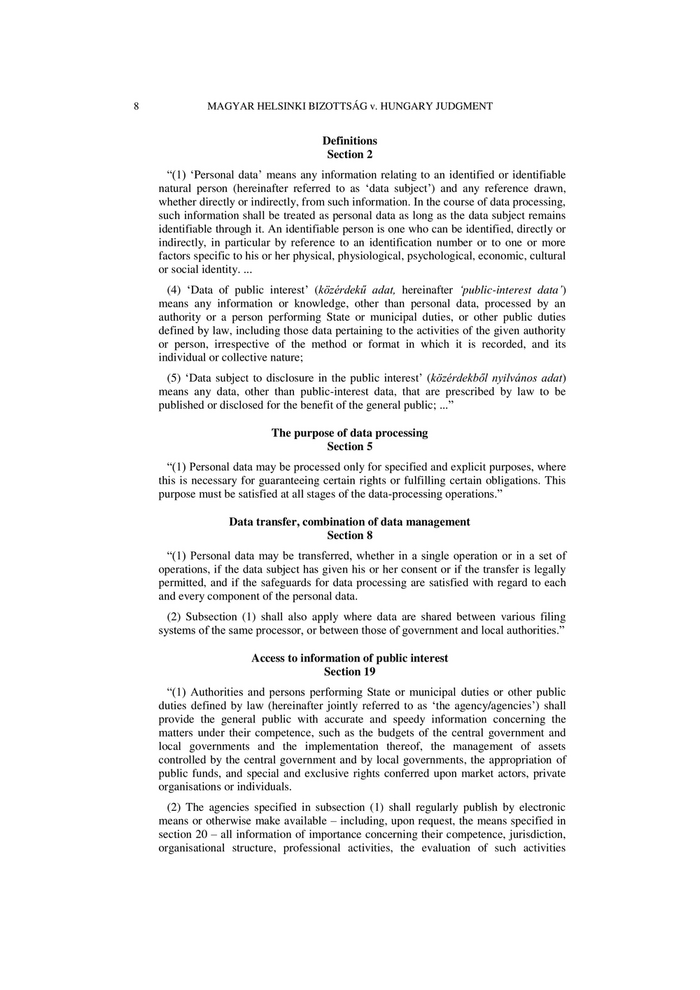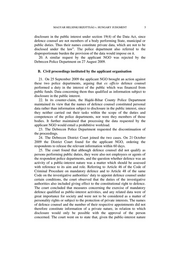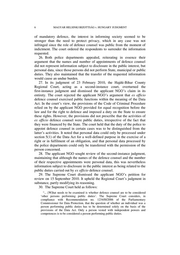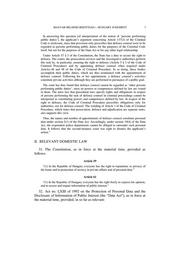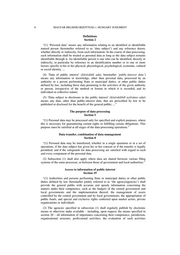Information
- Aktenzeichen
- 18030/11
- Datum
- 8. November 2016
- Gericht
- Europäischer Gerichtshof für Menschenrechte
- Gesetz
- Europäische Menschenrechtskonvention
Urteil: Europäischer Gerichtshof für Menschenrechte am 8. November 2016
18030/11
Der Europäische Gerichtshof für Menschenrechte stellt fest, dass die Weigerung einer ungarischen Behörde, Informationen über die Arbeit von Pflichtverteidigern gegenüber einer Nichtregierungsorganisation offenzulegen, gegen das Recht auf freie Meinungsäußerung aus Artikel 10 Europäische Menschenrechtskonvention verstößt. Die Weigerung behindert die Antragstellerin nämlich darin, in einer Sache von allgemeinem Interesse durch die Informationen zu einer öffentlichen Debatte beizutragen. Von dem Antrag sind zwar personenbezogene Daten im Sinne des Artikel 8 Europäische Menschenrechtskonvention betroffen (Namen der Verteidiger sowie Anzahl der Beauftragungen in bestimmten Verfahren), diese sind jedoch der öffentlichen Sphäre und nicht dem Privatleben der Betroffenen zuzurechnen. Die Entscheidung liegt ausschließlich in englischer und französischer Sprache vor. (Quelle: LDA Brandenburg)
Allgemein zugängliche Quelle Anwendungsbereich/ Zuständigkeit Interessenabwägung Personenbezogene Daten
GRAND CHAMBER CASE OF MAGYAR HELSINKI BIZOTTSÁG v. HUNGARY (Application no. 18030/11) JUDGMENT STRASBOURG 8 November 2016 This judgment is final but it may be subject to editorial revision.


MAGYAR HELSINKI BIZOTTSÁG v. HUNGARY JUDGMENT 1 In the case of Magyar Helsinki Bizottság v. Hungary, The European Court of Human Rights, sitting as a Grand Chamber composed of: Guido Raimondi, President, András Sajó, Işıl Karakaş, Luis López Guerra, Mirjana Lazarova Trajkovska, Angelika Nußberger, Boštjan M. Zupančič Nebojša Vučinić, Kristina Pardalos, Ganna Yudkivska, Linos-Alexandre Sicilianos, Helen Keller, André Potocki, Aleš Pejchal, Ksenija Turković, Robert Spano, Jon Fridrik Kjølbro, judges, and Lawrence Early, Jurisconsult, Having deliberated in private on 4 November 2015 and 1 September 2016, Delivers the following judgment, which was adopted on the last-mentioned date: PROCEDURE 1. The case originated in an application (no. 18030/11) against Hungary lodged with the Court under Article 34 of the Convention for the Protection of Human Rights and Fundamental Freedoms (“the Convention”) by a non-governmental organisation registered under Hungarian law, Magyar Helsinki Bizottság (“the applicant NGO”), on 14 March 2011. 2. The applicant NGO was represented by Mr T. Fazekas, a lawyer practising in Budapest. The Hungarian Government (“the Government”) were represented by Mr Z. Tallódi, Agent, Ministry of Justice. 3. The applicant NGO alleged under Article 10 of the Convention that the Hungarian courts’ refusal to order the disclosure of the information to which it had sought access amounted to a breach of its right to freedom of expression. 4. The application was assigned to the Second Section of the Court (Rule 52 § 1 of the Rules of Court). On 4 December 2012 the application

2 MAGYAR HELSINKI BIZOTTSÁG v. HUNGARY JUDGMENT was communicated to the Government. On 26 May 2015 a Chamber of the Second Section, composed of Işıl Karakaş, András Sajó, Nebojša Vučinić, Helen Keller, Egidijus Kūris, Robert Spano, Jon Fridrik Kjølbro, judges, and Stanley Naismith, Section Registrar, relinquished jurisdiction in favour of the Grand Chamber, neither of the parties having objected to relinquishment within the time allowed (Article 30 of the Convention and Rule 72 § 1). 5. The composition of the Grand Chamber was determined according to the provisions of Article 26 §§ 4 and 5 of the Convention and Rule 24. At the final deliberations, Boštjan M. Zupančič and Ksenija Turković, substitute judges, replaced Egidijus Kūris and Iulia Antoanella Motoc, who were prevented from sitting (Rule 24 § 3). 6. The applicant NGO and the Government each filed further written observations (Rule 59 § 1) on the merits. 7. On 2 September 2015 the United Kingdom Government were granted leave by the President of the Grand Chamber to intervene as a third party in the proceedings (Article 36 § 2 of the Convention and Rule 44 § 3). They filed their written observations on 18 September 2015. 8. In addition, on 21 September 2015 third-party comments were received from the following organisations, which had been granted leave by the President of the Grand Chamber to intervene in the written procedure (Article 36 § 2 of the Convention and Rule 44 § 2): Media Legal Defence Initiative, Campaign for Freedom of Information, ARTICLE 19, Access to Information Programme and the Hungarian Civil Liberties Union, acting jointly, and also Fair Trials. 9. A hearing took place in public in the Human Rights Building, Strasbourg, on 4 November 2015 (Rule 59 § 3). There appeared before the Court: (a) for the Government Mr Z. TALLÓDI, Agent, Ms M. WELLER, Co-Agent; (b) for the applicant NGO Mr T. FAZEKAS, Mr T.L. SEPSI, Mr CS. TORDAI, Counsel, Ms N. NOVOSZÁDEK, Adviser; (c) for the United Kingdom Government Mr J. COPPEL, QC, Counsel, Ms A. MCLEOD, Agent, Ms A. MAHMOOD, Adviser.

MAGYAR HELSINKI BIZOTTSÁG v. HUNGARY JUDGMENT 3 The Court heard addresses by Mr Tallódi, Mr Sepsi and Mr Coppel, as well as their replies to questions put by the Court. THE FACTS I. THE CIRCUMSTANCES OF THE CASE 10. The applicant, Magyar Helsinki Bizottság (Hungarian Helsinki Committee), is a non-governmental organisation (NGO) that was founded in 1989. It monitors the implementation of international human-rights standards in Hungary, provides legal representation to victims of alleged human-rights abuses and promotes legal education and training both in Hungary and abroad. Its main areas of activity are protecting the rights of asylum seekers and foreigners in need of international protection, and monitoring the human-rights performance of law-enforcement agencies and the judicial system. In particular, it focuses on access to justice, conditions of detention, and the effective enforcement of the right to defence. A. Background to the case 11. Between 2005 and 2007 the applicant NGO conducted a project “Model Legal Aid Board Programme” aimed at developing and testing a model to overcome shortcomings in the system for the ex officio appointment of defence counsel. The study summarising the outcome of the project was published in 2007 under the title “Without Defence”, suggesting that there should be a standard set of criteria developed to assess the quality of defence counsel’s work. 12. In 2008, as a follow-up to its 2005-2007 survey, the applicant NGO launched a new project entitled “The Right to Effective Defence and the Reform of the ex-Officio Appointment System”. Together with the Ministry of Justice and Law Enforcement and various bar associations, the applicant NGO developed a questionnaire aimed at evaluating the performance of defence counsel. It also assessed the quality of legal representation provided by ex officio appointed and retained defence counsel, by examining the case files in 150 closed criminal cases. In parallel, the applicant NGO made a contribution in respect of Hungary to the comparative research project “Effective Defence Rights in the European Union and Access to Justice: Investigating and Promoting Best Practices” carried out in nine European countries and funded by the European Commission and the Open Society Justice Initiative. The results of the two projects were presented at a conference in April 2009, the conclusions of which were summarised in the report “In the

4 MAGYAR HELSINKI BIZOTTSÁG v. HUNGARY JUDGMENT Shadow of Suspicion: A critical account of enforcing the right to an effective defence”. 13. In addition, the applicant NGO carried out continuous advocacy activities for reform of the ex officio appointments system; in cooperation with the Budapest Bar Association, it also drew up recommendations for a proposed code of professional ethics for ex officio defence counsel. 14. In the applicant NGO’s assessment, its research showed that the system of ex officio appointed defenders did not operate adequately, essentially because the investigative authorities, in particular the police, were free to choose defence counsel from a list compiled by the relevant bar associations. This gave rise to distrust on the part of defendants. Furthermore, according to the applicant NGO’s findings, many police departments had recourse to the same lawyers or law firms in the majority of cases, resulting in defence counsels’ dependency on ex officio appointments to earn their living. The applicant NGO also concluded that the selection system lacked transparency. 15. In 2009, in the framework of the project “Steps Towards a Transparent Appointment System in Criminal Legal Aid”, an experimental method was put in place, in cooperation with the applicant NGO, the county bar associations and certain county police departments. A key facet of this method was replacement of the existing system of discretionary appointments by a randomised computer-generated one. 16. As a feature of the project, the applicant NGO requested the names of the public defenders selected in 2008 and the number of assignments given to each lawyer from a total of twenty-eight police departments, situated in the seven Hungarian regions. The aim of the data request was to demonstrate whether there existed discrepancies in police departments’ practice in appointing defence counsel from the lists provided by the bar associations. These requests were made under section 20 (1) of Act no. LXIII of 1992 (“the Data Act”). The applicant NGO maintained that the number of defence counsel appointments was public-interest data (közérdekű adat) and that thus the names of defence counsel were data subject to disclosure in the public interest (közérdekből nyilvános adat). 17. Seventeen police departments complied with the request; a further five police departments disclosed the requested information following a successful legal challenge by the applicant NGO. 18. On 18 August 2009 the applicant NGO addressed the same request to the Hajdú-Bihar County Police Department, seeking access to information concerning the names of defence counsel appointed in the police department’s area of jurisdiction and the number of appointments given to each defence counsel. 19. In its response of 26 August 2009 the Hajdú-Bihar County Police Department refused the applicant NGO’s request, stating that “the names of the defence counsel are not public-interest data nor information subject to

MAGYAR HELSINKI BIZOTTSÁG v. HUNGARY JUDGMENT 5 disclosure in the public interest under section 19(4) of the Data Act, since defence counsel are not members of a body performing State, municipal or public duties. Thus their names constitute private data, which are not to be disclosed under the law”. The police department also referred to the disproportionate burden the provision of the data would impose on it. 20. A similar request by the applicant NGO was rejected by the Debrecen Police Department on 27 August 2009. B. Civil proceedings instituted by the applicant organisation 21. On 25 September 2009 the applicant NGO brought an action against these two police departments, arguing that ex officio defence counsel performed a duty in the interest of the public which was financed from public funds. Data concerning them thus qualified as information subject to disclosure in the public interest. 22. In its counter-claim, the Hajdú-Bihar County Police Department maintained its view that the names of defence counsel constituted personal data rather than information subject to disclosure in the public interest, since they neither carried out their tasks within the scope of the duties and competences of the police departments, nor were they members of those bodies. It further maintained that processing the data requested by the applicant NGO would entail a prohibitive workload. 23. The Debrecen Police Department requested the discontinuation of the proceedings. 24. The Debrecen District Court joined the two cases. On 21 October 2009 the District Court found for the applicant NGO, ordering the respondents to release the relevant information within 60 days. 25. The court found that although defence counsel did not qualify as persons performing public duties, they were also not employees or agents of the respondent police departments, and the question whether defence was an activity of a public-interest nature was a matter which should be assessed with reference to its aim and role. Referring to Article 46 of the Code of Criminal Procedure on mandatory defence and to Article 48 of the same Code on the investigative authorities’ duty to appoint defence counsel under certain conditions, the court observed that the duties of the investigative authorities also included giving effect to the constitutional right to defence. The court concluded that measures concerning the exercise of mandatory defence qualified as public-interest activities, and any related data were of great importance for society and were not to be considered as a matter of personality rights or subject to the protection of private interests. The names of defence counsel and the number of their respective appointments did not therefore constitute information of a private nature, in relation to which disclosure would only be possible with the approval of the person concerned. The court went on to state that, given the public-interest nature

6 MAGYAR HELSINKI BIZOTTSÁG v. HUNGARY JUDGMENT of mandatory defence, the interest in informing society seemed to be stronger than the need to protect privacy, which in any case was not infringed since the role of defence counsel was public from the moment of indictment. The court ordered the respondents to surrender the information requested. 26. Both police departments appealed, reiterating in essence their argument that the names and number of appointments of defence counsel did not represent information subject to disclosure in the public interest, but personal data, since those persons did not perform State, municipal or public duties. They also maintained that the transfer of the requested information would cause an undue burden. 27. In its judgment of 23 February 2010, the Hajdú-Bihar County Regional Court, acting as a second-instance court, overturned the first-instance judgment and dismissed the applicant NGO’s claim in its entirety. The court rejected the applicant NGO’s argument that ex officio defence counsel exercised public functions within the meaning of the Data Act. In the court’s view, the provisions of the Code of Criminal Procedure relied on by the applicant NGO provided for equal recognition before the law and for the right to defence and imposed a duty on the State to ensure these rights. However, the provisions did not prescribe that the activities of ex officio defence counsel were public duties, irrespective of the fact that they were financed by the State. The court held that the duty of the police to appoint defence counsel in certain cases was to be distinguished from the latter’s activities. It noted that personal data could only be processed under section 5(1) of the Data Act for a well-defined purpose in the exercise of a right or in fulfilment of an obligation, and that personal data processed by the police departments could only be transferred with the permission of the person concerned. 28. The applicant NGO sought review of the second-instance judgment, maintaining that although the names of the defence counsel and the number of their respective appointments were personal data, this was nevertheless information subject to disclosure in the public interest as being related to the public duties carried out by ex officio defence counsel. 29. The Supreme Court dismissed the applicant NGO’s petition for review on 15 September 2010. It upheld the Regional Court’s judgment in substance, partly modifying its reasoning. 30. The Supreme Court held as follows: “... [W]hat needs to be examined is whether defence counsel are to be considered ‘other persons performing public duties’. The Supreme Court considers, in compliance with Recommendation no. 1234/H/2006 of the Parliamentary Commissioner for Data Protection, that the question of whether an individual was a person performing public duties has to be determined solely on the basis of the provisions of the Data Act. Only a person vested with independent powers and competences is to be considered a person performing public duties.
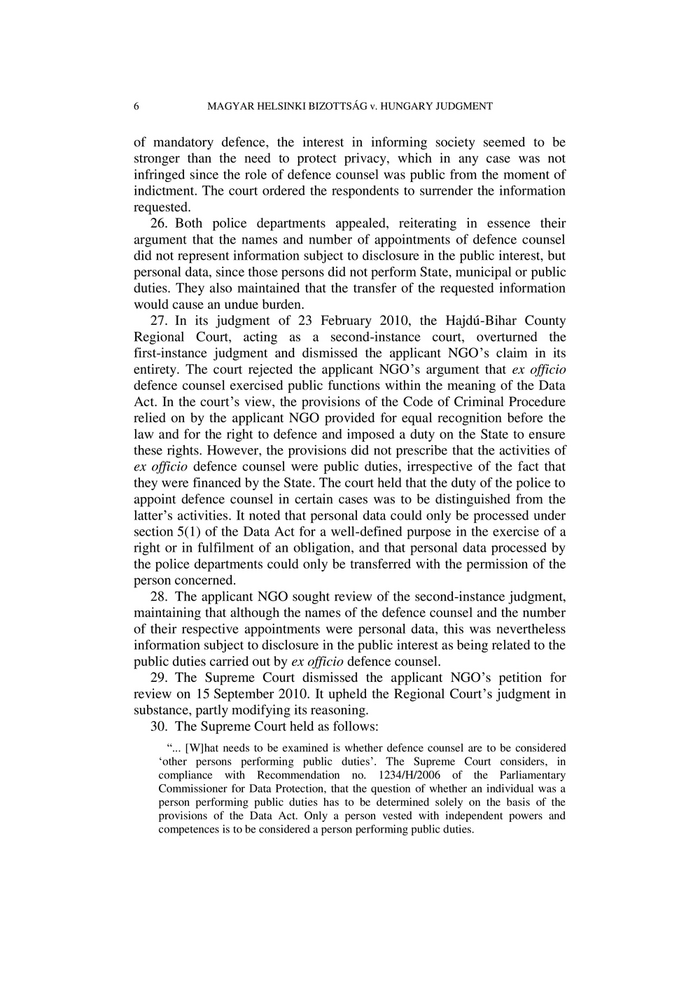
MAGYAR HELSINKI BIZOTTSÁG v. HUNGARY JUDGMENT 7 In answering this question [of interpretation of the notion of ‘persons performing public duties’], the applicant’s argument concerning Article 137(2) of the Criminal Code is irrelevant, since that provision only prescribes that defence counsel were to be regarded as persons performing public duties for the purposes of the Criminal Code itself, but not for the purposes of the Data Act or for any other legal relationship. Under Article 57 § 3 of the Constitution, the State has a duty to secure the right to defence. The courts, the prosecution services and the investigative authorities perform this task by, in particular, ensuring the right to defence (Article 5 § 3 of the Code of Criminal Procedure) and by appointing defence counsel when required under Articles 46 and 48 of the Code of Criminal Procedure. In so doing, these bodies accomplish their public duties, which are thus terminated with the appointment of defence counsel. Following his or her appointment, a defence counsel’s activities constitute private activities although they are performed in pursuance of a public goal. The court has thus found that defence counsel cannot be regarded as ‘other persons performing public duties’, since no powers or competences defined by law are vested in them. The mere fact that procedural laws specify rights and obligations in respect of persons performing the task of defence counsel in criminal proceedings cannot be interpreted as constituting powers and competences defined by law. In respect of the right to defence, the Code of Criminal Procedure prescribes obligations only for authorities, not for defence counsel. The wording of Article 1 of the Code of Criminal Procedure, which states that prosecution, defence and adjudication are separate tasks, also supports this view. Thus, the names and number of appointments of defence counsel constitute personal data under section 2(1) of the Data Act. Accordingly, under section 19(4) of the Data Act, the respondent police departments cannot be obliged to surrender such personal data. It follows that the second-instance court was right to dismiss the applicant’s action.” II. RELEVANT DOMESTIC LAW 31. The Constitution, as in force at the material time, provided as follows: Article 59 “(1) In the Republic of Hungary everyone has the right to reputation, to privacy of the home and to protection of secrecy in private affairs and of personal data.” Article 61 “(1) In the Republic of Hungary everyone has the right freely to express his opinion, and to access and impart information of public interest.” 32. Act no. LXIII of 1992 on the Protection of Personal Data and the Disclosure of Information of Public Interest (the “Data Act”), as in force at the material time, provided, in so far as relevant:
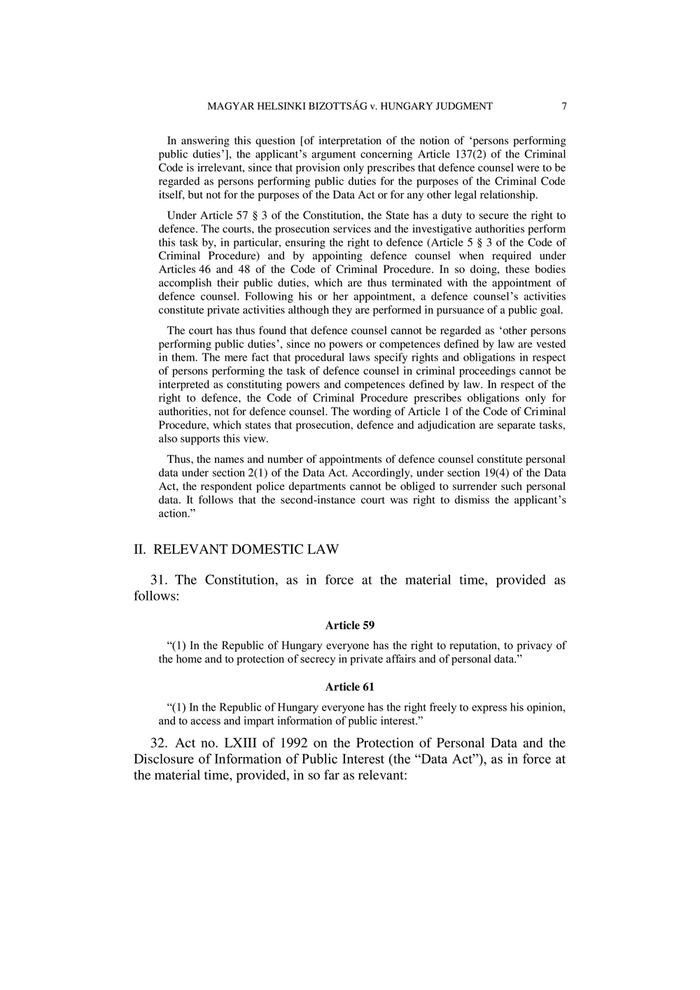
8 MAGYAR HELSINKI BIZOTTSÁG v. HUNGARY JUDGMENT Definitions Section 2 “(1) ‘Personal data’ means any information relating to an identified or identifiable natural person (hereinafter referred to as ‘data subject’) and any reference drawn, whether directly or indirectly, from such information. In the course of data processing, such information shall be treated as personal data as long as the data subject remains identifiable through it. An identifiable person is one who can be identified, directly or indirectly, in particular by reference to an identification number or to one or more factors specific to his or her physical, physiological, psychological, economic, cultural or social identity. ... (4) ‘Data of public interest’ (közérdekű adat, hereinafter ‘public-interest data’) means any information or knowledge, other than personal data, processed by an authority or a person performing State or municipal duties, or other public duties defined by law, including those data pertaining to the activities of the given authority or person, irrespective of the method or format in which it is recorded, and its individual or collective nature; (5) ‘Data subject to disclosure in the public interest’ (közérdekből nyilvános adat) means any data, other than public-interest data, that are prescribed by law to be published or disclosed for the benefit of the general public; ...” The purpose of data processing Section 5 “(1) Personal data may be processed only for specified and explicit purposes, where this is necessary for guaranteeing certain rights or fulfilling certain obligations. This purpose must be satisfied at all stages of the data-processing operations.” Data transfer, combination of data management Section 8 “(1) Personal data may be transferred, whether in a single operation or in a set of operations, if the data subject has given his or her consent or if the transfer is legally permitted, and if the safeguards for data processing are satisfied with regard to each and every component of the personal data. (2) Subsection (1) shall also apply where data are shared between various filing systems of the same processor, or between those of government and local authorities.” Access to information of public interest Section 19 “(1) Authorities and persons performing State or municipal duties or other public duties defined by law (hereinafter jointly referred to as ‘the agency/agencies’) shall provide the general public with accurate and speedy information concerning the matters under their competence, such as the budgets of the central government and local governments and the implementation thereof, the management of assets controlled by the central government and by local governments, the appropriation of public funds, and special and exclusive rights conferred upon market actors, private organisations or individuals. (2) The agencies specified in subsection (1) shall regularly publish by electronic means or otherwise make available – including, upon request, the means specified in section 20 – all information of importance concerning their competence, jurisdiction, organisational structure, professional activities, the evaluation of such activities
